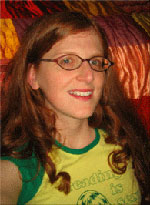1. What makes your program different from
other programs, or what made you choose your program?
There are several reasons why I chose this program. 1- When I started,
it was a new program, and I wanted to be involved in its
development. 2-I know the program directors who were phenomenal
and would make this a program of excellence. 3-Utah is an
amazing place to live.
2. If not
answered above, what's the best aspect of your program?
The best aspects are the faculty, other residents, and didactics
that include cadaver labs, ultrasound labs, airway labs, trauma
man, and lots of hands on teaching. Better than any other
interns in the hospital at procedures.
3. Are there any
major upcoming changes to your program?
Nothing major in the intern year, but things are always changing
as we start each year as a first class.
4. Is there
anything you would change about your program if you could? A
rural ED elective-this will probably happen anyway.
How much are you responsible for blood draws, putting
in IVs, etc.? Not at all, but you can if you want.
5. Do you learn
mostly from attendings, other residents, or textbooks? Does this
vary when you do off-service rotations?
Attendings mostly. Off service rotations are mostly residents
with rounds with attendings and usually a daily lecture.
6. How does EMed
rank in your hospital's hierarchy?
Initially, there was resistance because we were new. Now that
we've had a year of residents go through, I feel like we are
well respected and involved. Not many turf wars.
7. What are the
perks that your school provides (PDAs, textbooks,
conference fees, meal tickets, etc.)?
Meals while on call. Many textbooks-Tintanelli, Harwood-Nuss,
plus a few others. $150 for textbooks/PDAs, etc. About half of
the interns went to paid conferences last year.
8. How do you
rate your rotations outside of the emergency department?
Depends on which rotation and which time of year. Best
rotations are
ICU months.
9. What's the
best elective you've done?
Emergency ultrasound-Worked in the department with a supervisor,
did the Challenger CD, and read Ma's textbook. High yield
learning and lots of fun.
10. How much does
your program focus on research?
Each resident is required to perform a research project and a QA
project. Lots of flexibility depending on what you want to do.
Can work with EM attendings who publish a lot at Primary
Children's hospital, at the Poison
Control Center, LDS or UUMC
faculty. Many options for the serious or creative researcher.
11. What do you
love and hate most about the city you're in?
Love the mountains, weather, friendly people, skiing. Hate the
connection between politics and religion in the state.
12. Please
describe your typical month in terms of work hours and days off.
In ED months, you work 22, 20, or 18, 8-10 hour shifts
a month depending on which year plus weekly 5 hour didactic
sections. Other rotations about 80 hours a week with one day a
week off. Rarely work hour violations, never on ED months.
13. How much time
do you spend off-duty with the other residents?
We are a tight bunch and hang out regularly. Monthly parties
and we individually get together all of the time.
14. Do you have
any international experience?
I don't but other residents do.
15. What are your
plans after residency?
Unsure.
16. How prepared
do you feel?
Very- for only having internship behind me.
We get lots of attention, creative learning experiences, and as
much
autonomy as we can handle.
17. Is there
anything you'd like to tell us that we haven't asked?
This is the perfect program for someone who is academically
strong, has a good sense of humor, likes to work hard, be
innovative, and loves the outdoors. Incredibly caring
department who loves their residents. Good nursing support. 4
day retreat in an awesome cabin in the mountains with good food
and company. Zero tolerance for slackers though.
18. Do you have
any advice for current applicants, or is there anything you wish
you'd known when you were applying?
Pay attention to the kind of people in the programs. See who
you would fit in with. Most programs will teach you what you
need to know, but find out what kind of learner you are and what
environment would be the best for you. Make sure you are
somewhere where your partner will be happy.
